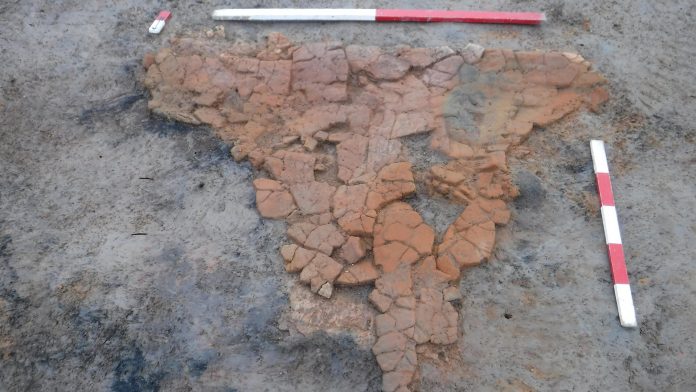Main Image: Base of a Roman oven: Allen Archaeology
Thousands of artefacts were discovered along the route of the Spalding Western Relief Road, Lincolnshire with some of the oldest activity dating back to the Iron Age.
According to Ian Marshman, historic environment officer for the county council, one of the most interesting finds has been an unusual type of Roman oven. “Whilst archaeologists have previously found small parts of these Roman ovens before, this is thought to be one of the best preserved examples ever found in Britain.
“The archaeology team hopes to reconstruct the oven’s shape and analyse its ash to better understand how it was used and what might have been cooked in it – giving us a fascinating insight into Roman industry and trade. “Ovens like this seem to have been used where there was a need to cook lots of bread quickly, like at the amphitheatre in Chester. So our current theory is that the ovens were used to bake bread for people making salt out in the fens.”
Other interesting finds unearthed include:
- Roman quern stone – would have been used to grind grain to make flour, perhaps for bread baked in the ovens. It was found in the bottom of a large Roman ditch, and might have been re-used as an anchor for a small Roman fen boat.
- Medieval thimble – made of copper alloy it looks just like the kind of thimbles still used to protect your finger when sewing today.
- Medieval knife handle – a humble everyday object made from bone, which had been polished smooth from years of use.
Dr Marshman added: “In the late Roman period, the site was inundated by rising water levels in the fens, caused by a climate change event that meant wetter colder weather.
“The team found evidence for activity again in the medieval period, once the area was no longer under water. Some pottery from the Saxon period was also found, which could mean that people returned to the site even earlier.”
Mick McDaid, Project Manager for Allen Archaeology – the firm contracted to research the site’s archaeology – said: “The first step in the investigation was to pull together and review all of the available resources related to this area of Spalding, including old maps, historical documents and previous nearby archaeological investigations.
“From there, trial holes were excavated to develope a better understanding of what might be found buried underground along the route. We then started to excavate the area.
“First, we carefully removed the topsoil from each area using a 14-tonne excavator. We then used shovels, spades, picks and barrows to expose features and artefacts before using lighter hand tools, like trowels and hand brushes, to excavate and clean what we’d uncovered.
“A full written record of each feature or layer was then produced, describing all its defining characteristics, including its relationship with other features we unearthed. Each discovery was also photographed, and GPS equipment was used document the specific location of each one on a map.
“Now that the excavation is finished, we will analyse the artefacts, animal bones and shells to help piece together more about the site’s long history. Archaeological scientists will also study samples of soil and charcoal to create a picture of the local environment, and how this was affected by climate change events in the past.”
Cllr Richard Davies, executive member for highways, said: “When building a new road, it’s not just about constructing bridges and laying tarmac. First and foremost, it’s really important to understand and protect the area’s heritage so future generations can learn from and understand its rich history.
“It’s truly amazing when you stop and think about what’s underneath the ground below your feet.”
With the archaeology now complete, further works on-site in the next few weeks will be the construction of a haul road and the main site compound, along with final preparatory gas protection works and borehole testing. Main construction works are expected to start in the spring (taking place off of local roads until summer – more details about traffic management to be shared once finalised and confirmed).
For the latest news on the Spalding Western Relief Road, visit www.lincolnshire.gov.uk/majorprojects.

